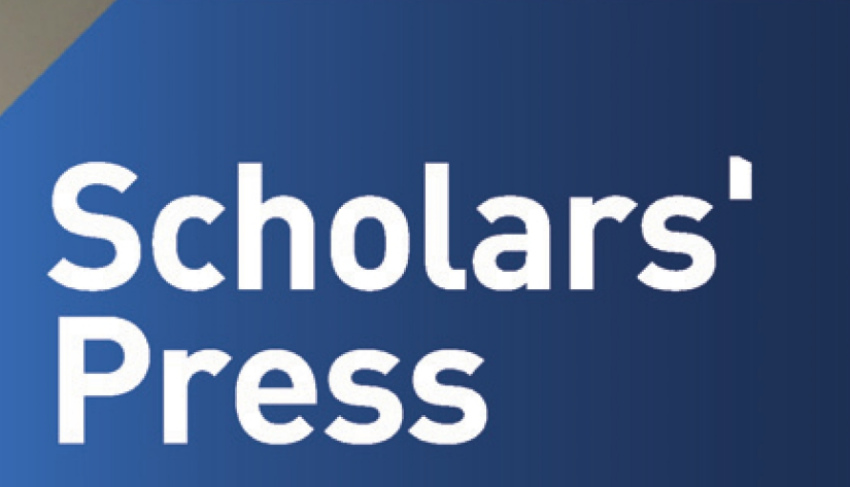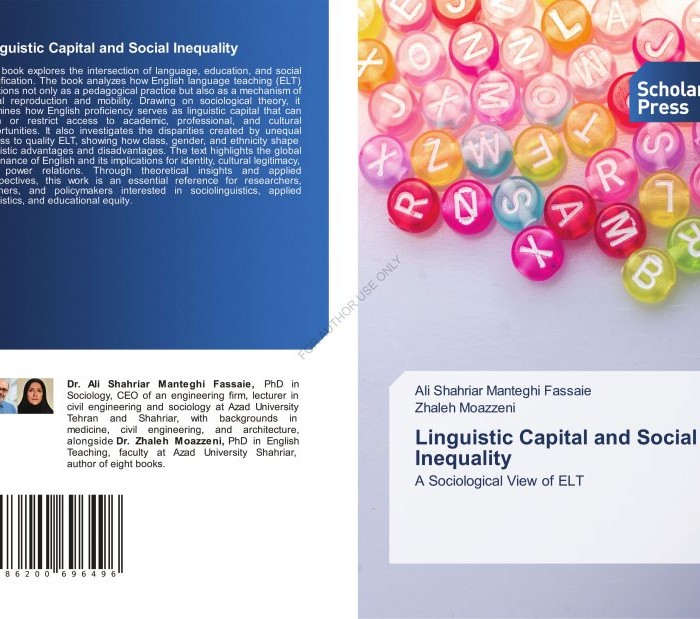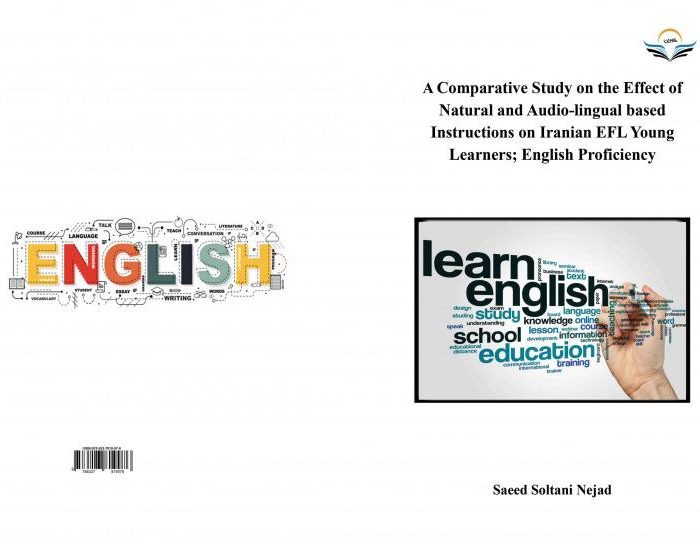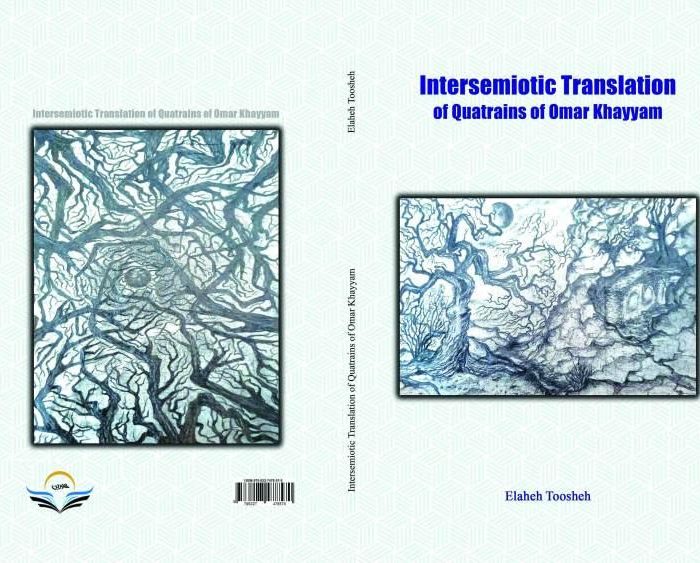کتاب Teachers’ Self-Efficacy and Self-Awareness and Learners’ Achievement
- صفحه نخست
- رشته ها
- ادبیات و زبان های خارجی
- زبان انگلیسی
- کتاب Teachers’ Self-Efficacy and Self-Awareness and Learners’ Achievement
کتاب Teachers’ Self-Efficacy and Self-Awareness and Learners’ Achievement
۴۷۸,۹۲۹ تومان قیمت اصلی: ۴۷۸,۹۲۹ تومان بود.۱۸۳,۵۸۹ تومانقیمت فعلی: ۱۸۳,۵۸۹ تومان.
| تعداد صفحات | 102 |
|---|---|
| شابک | 978-622-378-230-5 |
| انتشارات |

کتاب Teachers’ Self-Efficacy and Self-Awareness and Learners’ Achievement
درباره کتاب
کتاب Teachers’ Self-Efficacy and Self-Awareness and Learners’ Achievement به بررسی تأثیر خودکارآمدی و خودآگاهی معلمان بر عملکرد تحصیلی دانشآموزان میپردازد. این اثر پژوهشی بهطور خاص بر ارتباط میان خودکارآمدی معلمان (Self-Efficacy) و خودآگاهی (Self-Awareness) با موفقیت تحصیلی دانشآموزان در محیطهای آموزشی تمرکز دارد. نویسندگان این کتاب، در یک تحلیل جامع، عواملی که بر کارایی و انگیزه معلمان تأثیر میگذارند و در نتیجه بر پیشرفت تحصیلی دانشآموزان اثر میگذارند را بررسی میکنند.
موضوعات کلیدی کتاب
- خودکارآمدی معلمان: بررسی اهمیت خودکارآمدی معلمان در ایجاد انگیزه و تأثیر آن بر عملکرد تحصیلی دانشآموزان.
- خودآگاهی معلمان: تأثیر خودآگاهی بر تعاملات معلمان با دانشآموزان و استراتژیهای آموزشی آنها.
- ارتباط میان خودکارآمدی معلمان و موفقیت تحصیلی دانشآموزان: تحلیل اینکه چگونه احساس توانمندی و آگاهی معلمان میتواند موجب بهبود پیشرفت تحصیلی دانشآموزان شود.
- عوامل مؤثر بر موفقیت تحصیلی دانشآموزان: بررسی عواملی چون استراتژیهای آموزشی، انگیزههای دانشآموزان، و محیطهای یادگیری.
- مقایسه خودکارآمدی و خودآگاهی معلمان بر اساس جنسیت و سطوح مختلف مهارت زبانی: تحلیل تفاوتهای جنسیتی در میزان خودآگاهی و خودکارآمدی معلمان و چگونگی تأثیر آنها بر عملکرد تحصیلی دانشآموزان.
ویژگیهای کلیدی کتاب
- پژوهش جامع و سیستماتیک: این کتاب شامل تحلیلهایی دقیق از متغیرهای مختلف تأثیرگذار بر کارایی معلمان و موفقیت تحصیلی دانشآموزان است.
- روششناسی پژوهش: در این کتاب از یک روش تحقیق کیفی و کمی برای بررسی ارتباط بین خودکارآمدی و خودآگاهی معلمان با موفقیت دانشآموزان استفاده شده است.
- مقایسه جنسیتی: بررسی تفاوتهای جنسیتی در خودکارآمدی و خودآگاهی معلمان و تأثیر آنها بر دستاوردهای تحصیلی دانشآموزان.
- پیشنهادات کاربردی: کتاب بهطور عملیاتی نتایج خود را برای بهبود آموزش و پرورش ارائه داده و به معلمان و محققان راهکارهایی برای بهبود کیفیت آموزش ارائه میدهد.
چرا باید این کتاب را خواند؟
کتاب Teachers’ Self-Efficacy and Self-Awareness and Learners’ Achievement برای معلمان، پژوهشگران و افرادی که به حوزههای روانشناسی آموزش و توسعه حرفهای معلمان علاقه دارند، یک منبع بینظیر است. این کتاب به بررسی چگونگی تأثیر خودآگاهی و خودکارآمدی معلمان بر یادگیری و دستاوردهای تحصیلی دانشآموزان پرداخته و راهکارهایی برای بهبود آموزش ارائه میدهد.
مخاطبان هدف
- معلمان و مربیان: این کتاب میتواند به معلمان کمک کند تا آگاهی بیشتری از تأثیر خودآگاهی و خودکارآمدی خود بر فرآیند یادگیری دانشآموزان پیدا کنند و بهبودهایی در روشهای تدریس خود ایجاد کنند.
- پژوهشگران و دانشجویان علوم تربیتی: برای پژوهشگران و دانشجویان علاقهمند به مطالعات آموزشی، این کتاب منبعی ارزشمند از پژوهشهای تجربی در زمینه خودآگاهی و خودکارآمدی معلمان است.
- مدیران آموزشی و سیاستگذاران: مدیران و سیاستگذاران آموزشی نیز میتوانند از یافتههای این کتاب برای ارتقای کیفیت آموزش و فراهم آوردن محیطهای یادگیری مؤثرتر استفاده کنند.
سفارش کتاب
برای خرید کتاب Teachers’ Self-Efficacy and Self-Awareness and Learners’ Achievement و دریافت نسخه چاپی یا دیجیتال آن، به سایت مربوطه مراجعه کنید. این کتاب میتواند به معلمان، پژوهشگران و علاقهمندان به ارتقای آموزش و پرورش و موفقیت تحصیلی دانشآموزان کمک زیادی کند.
پرسش و پاسخ برای کتاب “Teachers’ Self-Efficacy and Self-Awareness and Learners’ Achievement”
۱. خودکارآمدی معلمان (Self-Efficacy) چیست و چه تأثیری بر عملکرد آنها و موفقیت دانشآموزان دارد؟
خودکارآمدی معلمان به باور آنها به تواناییهای خود برای انجام مؤثر وظایف تدریس گفته میشود. این ویژگی میتواند تأثیر زیادی بر عملکرد معلم و در نتیجه بر موفقیت تحصیلی دانشآموزان داشته باشد. معلمان با خودکارآمدی بالا بیشتر قادرند به روشهای مؤثر تدریس بپردازند و به طور مؤثری به تعامل با دانشآموزان بپردازند، که موجب ارتقای عملکرد تحصیلی دانشآموزان میشود. 📚👩🏫
۲. خودآگاهی معلمان (Self-Awareness) به چه معناست و چگونه بر کارآیی آموزشی آنها تأثیر میگذارد؟
خودآگاهی معلمان به درک آنها از نقاط قوت و ضعف خود، احساسات و افکارشان در محیط آموزشی اشاره دارد. معلمان با خودآگاهی بالا قادرند به طور مؤثرتر واکنشهای خود را در محیط کلاس کنترل کنند، با مشکلات کلاس مواجه شوند و از مشکلات آموزشی آگاه شوند. این خودآگاهی میتواند به بهبود روشهای تدریس و افزایش موفقیت تحصیلی دانشآموزان منجر شود. 🧠📊
۳. مهمترین عواملی که بر موفقیت دانشآموزان تأثیر میگذارند کدامند؟
عوامل مختلفی میتوانند بر موفقیت تحصیلی دانشآموزان تأثیر بگذارند، از جمله خودکارآمدی معلمان، استراتژیهای تدریس، انگیزش دانشآموزان، کیفیت محیط آموزشی، روابط مثبت بین معلم و دانشآموز، و حمایتهای خانوادگی و اجتماعی. پژوهشها نشان میدهند که ترکیب این عوامل میتواند به ارتقای موفقیت تحصیلی دانشآموزان کمک کند. 📈🎓
۴. چگونه میتوان خودکارآمدی معلمان را اندازهگیری کرد؟
اندازهگیری خودکارآمدی معلمان معمولاً از طریق پرسشنامهها و مقیاسهای خودگزارشی انجام میشود که میزان اعتماد معلمان به تواناییهای خود را در انجام وظایف مختلف تدریس ارزیابی میکند. این پرسشنامهها میتوانند به تحلیل دقیقتر میزان خودکارآمدی معلمان و شناسایی نقاط قوت و ضعف آنها کمک کنند. 📝
۵. رابطه بین خودکارآمدی معلمان و موفقیت دانشآموزان چگونه است؟
پژوهشها نشان میدهند که هرچه خودکارآمدی معلمان بیشتر باشد، آنها بیشتر قادرند بر موفقیت دانشآموزان تأثیر بگذارند. معلمان با اعتماد به نفس و خودکارآمدی بالا معمولاً از روشهای تدریس کارآمدتری استفاده میکنند، ارتباط بهتری با دانشآموزان برقرار میکنند و در نهایت باعث افزایش مشارکت و یادگیری دانشآموزان میشوند. 🏅👨🏫
۶. تفاوت خودکارآمدی و خودآگاهی معلمان در چیست؟
خودکارآمدی معلمان به باور آنها به تواناییهای خود برای انجام وظایف تدریس مؤثر اشاره دارد، در حالی که خودآگاهی بیشتر به درک معلم از وضعیت عاطفی، شناختی و رفتاری خود در محیط آموزشی مربوط است. در حالی که هر دو عامل بر عملکرد معلمان تأثیر میگذارند، خودکارآمدی بیشتر به توانایی انجام کارها و خودآگاهی به درک بهتر از فرآیندها و واکنشها مربوط است. 🤔📚
۷. چگونه تفاوتهای جنسیتی (مرد و زن) در خودکارآمدی و خودآگاهی معلمان بر موفقیت دانشآموزان تأثیر میگذارد؟
تحقیقات نشان میدهند که معلمان مرد و زن ممکن است دیدگاهها و روشهای تدریس متفاوتی داشته باشند که بر موفقیت تحصیلی دانشآموزان تأثیر میگذارد. به طور مثال، ممکن است معلمان زن بیشتر در تعاملات عاطفی با دانشآموزان موفق باشند، در حالی که معلمان مرد ممکن است به روشهای ساختاریتر و رقابتی تمایل بیشتری داشته باشند. این تفاوتها میتوانند بر نحوه آموزش و میزان موفقیت دانشآموزان تأثیر بگذارند. 👩🏫👨🏫
۸. چگونه خودکارآمدی و خودآگاهی معلمان بر میزان مشارکت و انگیزه دانشآموزان تأثیر میگذارد؟
معلمان با خودآگاهی و خودکارآمدی بالا معمولاً توانایی بیشتری در ایجاد محیط آموزشی مثبت و حمایتگر دارند. این ویژگیها باعث میشود که دانشآموزان انگیزه بیشتری برای مشارکت در کلاس و یادگیری پیدا کنند. معلمان با احساس خودکارآمدی بالا به دانشآموزان اعتماد بیشتری به نفس میدهند و فضای آموزشی را به محیطی فعالتر و پرانرژیتر تبدیل میکنند. 💪👩🎓
۹. چه تفاوتهایی در خودکارآمدی و خودآگاهی معلمان در سطوح مختلف تسلط زبانی وجود دارد؟
در سطوح مختلف تسلط زبانی، معلمان ممکن است به روشهای متفاوتی به تدریس بپردازند. معلمان با تسلط زبان پایینتر ممکن است نیاز به افزایش خودکارآمدی و خودآگاهی خود داشته باشند تا بتوانند بهتر به دانشآموزان در سطوح مختلف کمک کنند. در مقابل، معلمان با تسلط بالا به زبان ممکن است توانایی بیشتری در مدیریت کلاس و تدریس مؤثر داشته باشند. 🗣️📚
۱۰. چه پیامدهای آموزشی از خودکارآمدی و خودآگاهی معلمان برای دانشآموزان میتوان گرفت؟
نتایج نشان میدهند که معلمان با خودکارآمدی بالا و خودآگاهی بالا میتوانند محیط یادگیری مثبت و حمایتی ایجاد کنند که در آن دانشآموزان به طور مؤثرتر یاد بگیرند. این ویژگیها باعث بهبود عملکرد تحصیلی، افزایش اعتماد به نفس و مشارکت بیشتر دانشآموزان در کلاس میشوند. به علاوه، معلمان میتوانند به طور مؤثرتری با چالشها و مشکلات یادگیری دانشآموزان برخورد کنند. 🏆👨🎓
این پرسش و پاسخها به طور جامع به مفاهیم کلیدی کتاب “Teachers’ Self-Efficacy and Self-Awareness and Learners’ Achievement” پرداخته و زمینههای مختلف تأثیر خودکارآمدی و خودآگاهی معلمان را بر موفقیت دانشآموزان توضیح میدهند.
| تعداد صفحات | 102 |
|---|---|
| شابک | 978-622-378-230-5 |
| انتشارات |
.فقط مشتریانی که این محصول را خریداری کرده اند و وارد سیستم شده اند میتوانند برای این محصول دیدگاه ارسال کنند.
محصولات مشابه
-
کتاب Linguistic Capital and Social Inequality A Sociological View of ELT
۴۱۴,۰۰۰ تومانقیمت اصلی: ۴۱۴,۰۰۰ تومان بود.۱۸۲,۱۶۰ تومانقیمت فعلی: ۱۸۲,۱۶۰ تومان. -
کتاب A Comparative Study on the Effect of Natural and Audio-lingual based Instructions on Iranian EFL Young Learners’ English Proficiency
۴۶۸,۰۰۰ تومانقیمت اصلی: ۴۶۸,۰۰۰ تومان بود.۱۸۲,۵۲۰ تومانقیمت فعلی: ۱۸۲,۵۲۰ تومان. -
کتاب When Tuba Wept
۵۸۵,۰۰۰ تومانقیمت اصلی: ۵۸۵,۰۰۰ تومان بود.۱۹۵,۰۰۰ تومانقیمت فعلی: ۱۹۵,۰۰۰ تومان. -
کتاب Intersemiotic Translation of Quatrains of Omar Khayyam
۴۴۶,۷۸۶ تومانقیمت اصلی: ۴۴۶,۷۸۶ تومان بود.۱۷۷,۲۲۶ تومانقیمت فعلی: ۱۷۷,۲۲۶ تومان.













دیدگاهها
هیچ دیدگاهی برای این محصول نوشته نشده است.